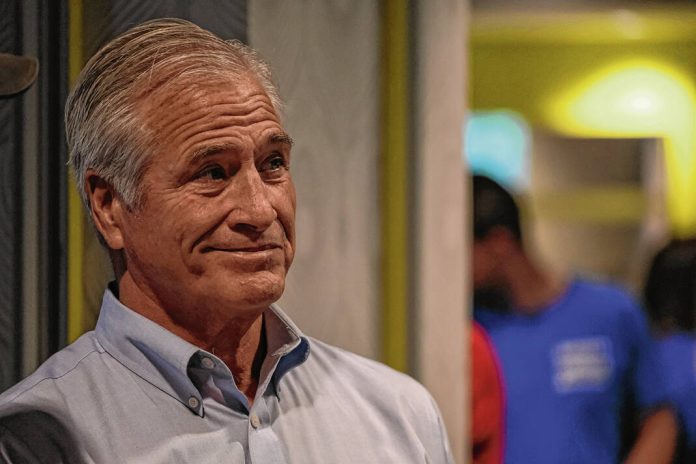
Mike Wolanin | The Republic Bartholomew County Commissioner candidate Larry Kleinhenz looks at vote totals during the Bartholomew County Republican Party primary election results watch party at Hotel Indigo in Columbus, Ind., Tuesday, May 7, 2024.
GOP Bartholomew County Commissioner District 1
Larry Kleinhenz: 4,179 (58.41%)
Rick Miller: 2,976 (41.59%)
Eight-time incumbent Larry Kleinhenz has clinched the GOP nomination in the race for the Bartholomew County Commissioner District 1 seat.
The district includes much of the northern and western parts of Bartholomew County, including Haw Creek, Flat Rock, and German and Harrison townships.
Kleinhenz has represented the district since first taking office in January of 1993. In the nine primaries for the seat he’s been in since that time, he’s faced six challengers. He told the Republic he was glad the primary had concluded.
“You always feel relieved, grateful that it’s over, I don’t think anyone enjoys running for office, it’s difficult,” Kleinhenz said. “… I’m always very aware of the fact that not everyone’s happy in the room, you know, at party headquarters and the community. And I really am sensitive to that.”
He also commended opponent Rick Miller for his campaign, saying it’s not necessarily easy to run against an incumbent.
“I did that once many, many years ago and it takes a lot of courage,” Kleinhenz said of his opponent.
Kleinhenz will face Democrat Josh Burbrink in the general election on November 5. Burbrink, who ran unopposed in the Democratic primary, has a background in information technology, graduated from Columbus East in 2004 and has an associate’s degree in computer networking from ITT Tech in Indianapolis.
Burbrink last ran for public office in 2022 for the District 4 seat on the Bartholomew County Council before losing to Jorge Morales.
The winner of the November race will join Republican Carl Lienhoop, who won a sixth consecutive term in 2022, and likely Republican Tony London, who is currently running unopposed this cycle for the District 3 seat. Bartholomew County Democratic Party chairman Ross Thomas has until noon on July 3 to put forth a candidate to fill the District 3 vacancy on the Democratic side, if local party officials choose to do so.
The 65 year-old Kleinhenz works on his family farm and operates several businesses and real estate ventures under Kleinhenz & Co. Kleinhenz is married to his wife Annette and has 11 children. He attended Columbus North High School and Western Kentucky University.
One issue that has attracted significant attention from local animal advocates is whether the commissioners should change current animal control ordinances and adopt animal welfare ordinances similar to those approved by the city in 2022.
Disagreements between the commissioners and local animal advocacy group Change 4 Bartholomew County have often played out on social media and in public, with advocates saying the commissioners aren’t doing enough to protect animals and the commissioners saying that the county has neither the budget nor manpower to provide animal welfare.
The words “control” and “welfare” are of particular importance here because they encompass differing approaches for caring for animals.
Animal control refers to the impoundment and care of animals found at large, discovered to be in violation of the law, or those animals surrendered to the department. In contrast, animal welfare refers to protecting animals, done by veterinary services, education, cruelty investigation and advocacy.
Advocates have also pressed the commissioners to adopt an Animal Control Welfare Board, somewhat similar to the Bartholomew County Animal Control Commission that was dissolved in late 1998.
The board had acted as a liaison between the citizens, county animal control officers and the commissioners. According to accounts previously published in The Republic, the board was intended “to provide private citizens representation as a forum to ensure the equitable enforcement of animal control regulations.”
Miller had said the matter would be “open to discussion,” while Kleinhenz, along with commissioners Lienhoop and London, has consistently said he was satisfied with the ordinance as it is now and had pointed towards the difference between the more rural county and the city and how they may view their animals.
Kleinhenz said the commissioners had worked with the group three years ago when they amended the county ordinance to ban puppy mills in the county, but the group had pushed for laws that would “limit individuals rights concerning their animals,” that the commissioners were uncomfortable with.
“We’re certainly concerned about animal welfare, but we think most of our population is concerned as well and we didn’t need new and additional laws.”
Other pertinent issues for voters he believed are those related to solar power and the ongoing debate regarding biosolids.




